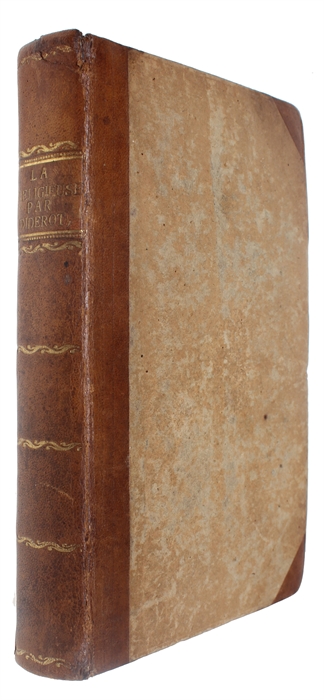CALLING OUT RELIGIOUS INSTITUTIONS
DIDEROT, (DENIS).
La Religieuse.
Paris, Buisson, (1796/97) - An Cinquième De La République.
8vo. Very nice contemporary half calf with gilt spine. Minor, barely noticeable repair to upper capital and slight bumping to corners. A very nice and clean copy, with only very minor brownspotting. Printed on good paper. With the half-title (bearing the "Décret concernant les Contrefacteurs" on verso). Book plate of Guy de Portuales to inside of front board. (4), 411, (1) pp.
The very rare first edition of Diderot's famous novel, "The Nun", which was actually begun as an elaborate practical joke, but which ended up as one of the most famous novels of the period.
A great succes-de-scandale, "The Nun" has both fascinated and unsettled the vast reading public since its first appearance. It started out as a series of letters from a fictitious character, the nun Suzanne, to one of Diderot's friends, the Marquis de Crosmare (who Diderot was trying to lure back to Paris), describing her intolerable life in the convent and imploring him to help regain her freedom and her renounce her vows.
The fictitious letters were later revised and written in to the novel that we know today. The work was completed in ab. 1780 and was published posthumously in 1796/97, attracting enormous attention and bringing to light a number of issues that had not previously been publically addressed.
It focuses on the then-current practice of forcing young women into convents in order to get them out of the way, on the unnatural life of the convents, and on the corruption in religious institutions and among the clergy. As such, it caused an outrage when it appeared and and became an instant succes-de-scandale.
"A novel mingling mysticism, madness, sadistic cruelty and nascent sexuality, it gives a scathing insight into the effects of forced vocations and the unnatural life of the convent. A succes de scandale at the end of the eighteenth century, it has attracted and unsettled readers ever since. For Diderot's novel is not simply a story of a young girl with a bad habit; it is also a powerfully emblematic fable about oppression and intolerance. This new translation includes Diderot's all-important prefatory material, which he placed, disconcertingly, at the end of the novel, and which turns what otherwise seems like an exercise in realism into what is now regarded as a masterpiece of proto-modernist fiction." (From the Oxford University Press edition, 2005).
Tchemerzine IV:471
Order-nr.: 52668


